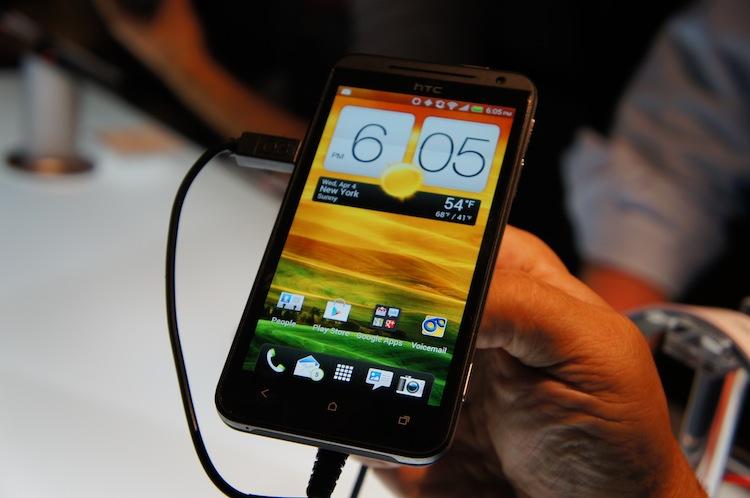
Last night in New York, HTC and Sprint came together to announce their "latest collaboration." While the HTC EVO 4G LTE isn't quite the name we were expecting (or hoping for, for that matter), the device is pretty close to what rumors have been telling us for weeks.
For $199.99 with a two-year agreement later this quarter, the EVO 4G LTE will release on the Now Network's new LTE network. It features a 4.7-inch 720p Super LCD display, a 1.5GHz dual-core Snapdragon S4 chip, 16GB built-in storage, 1GB RAM, microSD card slot and an 8-megapixel rear camera with a f/2.0 lens and ImageSense. All of that comes encased in a trim (8.9mm), brushed aluminum body with a relatively sturdy kickstand that works both ways (so you can charge while you prop and play media). The major difference in the EVO 4G LTE and the EVO One we heard so many rumors about is the battery capacity. Instead of the 2,650mAh battery we were expecting, the EVO 4G LTE actually comes with a 2,000mAh non-removable cell. That's better than most its competitors, yet not as great as an even larger battery would have been, especially because it is non-removable.
Both HTC and Sprint's objective with this device is to follow-up one of the most popular Android handsets to date, the EVO 4G, which launched back in June of 2010. They strive to rejuvenate and set new standards for the EVO name, which they say has always been a model for top-tier phones. Sprint product chief, Fared Adib, said, "The new EVO will quickly become the smartphone that sets the bar for the best smartphones in 2012."
The question now is: can the EVO 4G LTE rebuild the EVO brand? And will it be the best phone of the year?
Living up to and filling the shoes of the EVO 4G is enough as it is. While the original DROID may still be viewed as the device that finally put Android on the map, the EVO 4G is the one that pushed it over the top. It was big, bold and featured all of the best specifications of its time, though I have always felt it was lacking a bit on the design front. I continue to spot the original EVO on the street all the time and a lot of the people I talk too are still content with it.
Since then, however, Sprint has tried to keep that ball rolling with a few other EVO devices: EVO Shift 4G, EVO Design 4G and EVO 3D. Effectively, all this has done is dilute the EVO moniker and status with mostly mediocre devices. I'm not saying that any of those devices aren't great phones or weren't worth buying at the time of launch. But they weren't worthy of the EVO title if Sprint and HTC feel the EVO title is a prestigious as they made it out to be last night.
Jonah Becker, a designer on the HTC team, said, "EVO stands for the very best." I'm sure Verizon and Motorola (and possibly HTC) would say the same thing about their DROID devices. But we all know good and well that neither DROID nor EVO stand for the very best anymore. Take the HTC DROID Eris, for example. It was always a mid-range to low-end phone. And the EVO Shift 4G, while it is a perfectly fine phone, was never the best of its time.
Just like DROID, EVO is dead. It stands for nothing more than separating HTC phones on Sprint's network from the rest of the crop. It no longer stands for "the best." That ended after the original EVO was followed-up with just okay phones.
The HTC EVO 4G LTE isn't going to change that. It can't change that. But it's a great device, maybe better than anything currently out. After seeing all of the press images and hearing several HTC and Sprint employees build the device up, I honestly felt like they were compensating for something -- maybe drawing my attention away from the less impressive features of the device. But after getting some hands-on time with it, I can truthfully say that it's easily one of the nicest Android phones I've ever held, inside and out. I may not agree with some of the design aspects (like the glossy black finish on the back of the phone, which is atrocious), but it's truly a beautiful phone. Sprint and HTC have every right to be excited over the launch of this device and Sprint's LTE network.
But waging so much on rebuilding the EVO status is simply useless. It's old, used and worn out, and I hardly believe any new device will draw as much attention and hype as the original EVO did. Those were different times, when new phones weren't outdated in a matter of weeks, leaps in technology were far greater and there was a reason to get excited.
What isn't old and worn out, however, is HTC's One series, which has gained a ton of traction and attention lately. I cannot, for the life of me, wrap my head around why Sprint and HTC decided to drop "One" from the name completely.
I know, it's just a name, Taylor. What's in a name? But Sprint and HTC could have come together and played the name game a little better; they could have transitioned the EVO line into the One series (similar to what Samsung did with the Galaxy Nexus). Instead, they killed any official ties to One for a terrible (it's friggin' six syllables!) name to tie it to a washed-up brand that has seen far better days.